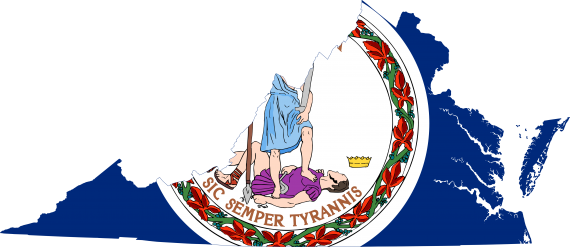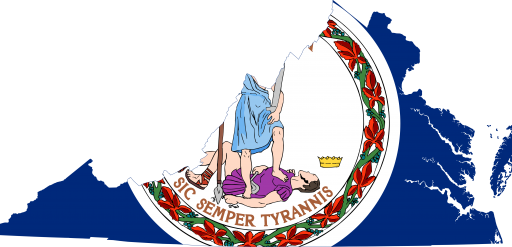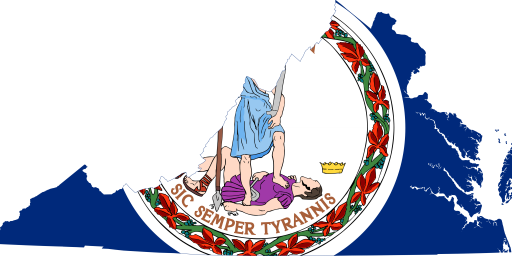Virginia Governor’s Race Tightens, Libertarian Robert Sarvis A Factor
The race for Governor in Virginia is tightening, and Libertarian Party nominee Robert Sarvis is one of the reasons why.
With Labor Day two weeks behind us, we’re now at the point where it makes a lot more sense to pay attention to the polling in the Virginia Governor’s race, which is shaping up to be the only truly contested race this year. For most of the summer, we’ve seen Democrat Terry McAuliffe maintain a steady lead against Republican Ken Cuccinelli. However, those numbers are now tightening to within the margin of error. Perhaps more significantly, Libertarian Party candidate Robert Sarvis, most recently the subject of an interesting Time Magazine profile and a surprisingly positive column by Jennifer Rubin, is quickly becoming the most interesting factor in a race that looks like its heading for a photo finish.
The polling that has come out in the last several days tells the story.
First up, we’ve got a poll from Republican leaning Harper that has McAuliffe’s lead slipping to five points, with Sarvis pulling in 10% of the vote:
Our survey shows Democrat Terry McAuliffe leading Republican Attorney General Ken Cuccinelli 42%-37% in a race that is being heavily affected by Libertarian candidate Robert Sarvis, who is polling at 10%
As a Libertarian, the assumption that Sarvis is siphoning votes from Republican Cuccinelli is only partly true. Sarvis’ support on the ballot comes from 4% of Democrats, 7% of Republicans and 18% of independent or third party voters, some of whom are undoubtedly Libertarians.
It must be noted that third party candidates very often perform better in polling than they do at the ballot box. Therefore, the migration of Sarvis’ voters (10%) and undecided voters (11%) to one of the two candidates will determine the outcome of the race.
Sarvis’ supporters hold largely negative opinions about the two other candidates: 19% have a favorable opinion of Cuccinelli and 12% have a favorable opinion of McAuliffe; 64% have an unfavorable opinion of Cuccinelli and 71% have an unfavorable opinion of McAuliffe. A slight edge goes to Cuccinelli in the fight for Sarvis’ supporters.
Undecided voters share the same general opinions regarding the two candidates: Cuccinelli (6% favorable, 40% unfavorable) and McAuliffe (7% favorable, 29% unfavorable). While this shows a slight edge for McAuliffe among undecided voters, a full 55% have yet to form an opinion of Cuccinelli and 63% have yet to form an opinion of McAuliffe.
There is clearly a significant pool of voters, largely independent, who will tune into the race over the course of the remaining seven weeks of the campaign. Cuccinelli and McAuliffe must delicately make a play for voters who generally dislike them both if they are to win the race.
A new Quinnipiac poll, meanwhile, has the gap between McAuliffe and Cuccinelli shrinking to 3%, with Sarvis garnering 7% of the vote:
With 7 percent of likely voters, Robert Sarvis, the Libertarian candidate in the too-close-to call Virginia governor’s race, could hold the key to victory for Democrat Terry McAuliffe, who has 44 percent of likely voters, or Republican State Attorney General Ken Cuccinelli, who has 41 percent, according to a Quinnipiac University poll released today.
Democrat McAuliffe gets a split 38 – 38 percent favorability rating, the independent Quinnipiac (KWIN-uh-pe-ack) University poll finds, compared to Republican Cuccinelli’s negative 34 – 51 percent rating. For Sarvis, 85 percent don’t know enough about him to form an opinion.
There are measurable racial and gender gaps in the race for governor as Cuccinelli leads 48 – 38 percent among white voters while blacks go to McAuliffe 77 – 9 percent. Women back the Democrat 49 – 35 percent while men back the Republican 47 – 40 percent.
Only 6 percent of likely voters are undecided seven weeks before Election Day, but 12 percent of those who name a candidate say there is a “good chance” they will change their mind.
“Terry McAuliffe is less disliked than State Attorney General Ken Cuccinelli. Voters are not wild about either man, and that may be one reason why Libertarian Robert Sarvis is running so well,” said Peter A. Brown, assistant director of the Quinnipiac University Polling Institute. “History tells us that third-party candidates tend to experience shrinking support as Election Day nears. If Sarvis does get 7 percent of the actual vote, that would reflect not just his strength but the weakness of the major party candidates.
“Right now, we can’t tell whether Sarvis’ candidacy is hurting Cuccinelli more than McAuliffe,” said Brown. “The Libertarian candidate is getting 3 percent of the Republican vote and 2 percent of the Democratic vote, but 14 percent of independent voters.”
“Since there are more people in Virginia who now consider themselves Democrats than Republicans, logic says that Cuccinelli needs a solid margin among independent voters. Instead, these voters are divided 37 – 37 percent between the Democrat and Republican,” Brown added.
Finally, the new Roanoke College poll has McAuliffe with an ultra-thin one-point lead over Cuccinelli and Sarvis getting support from 8% of those surveyed:
With fewer than 50 days until Election day, large blocks of voters remain undecided in Virginia’s three statewide races, and the gubernatorial race remains a statistical dead heat between two suffering from resilient unpopularity, a new Roanoke College poll shows.
At 35 percent, Democrat Terry McAuliffe leads by a statistically insignificant 2 percentage points over Republican Ken Cuccinelli’s 33 percent, according to the poll of 874 likely voters last week with a margin of error of plus or minus 3 percentage points. Libertarian Robert Sarvis is at 8 percent.
“Voters continue to learn more about the candidates, but, in this case, familiarity appears to be breeding contempt,” said Harry Wilson, director of the college’s Institute for Policy and Opinion Research, in a Thursday news release.
Both candidates had unfavorable ratings that surpassed their favorables, the poll shows. Some 42 percent of voters have an unfavorable impression of Cuccinelli, compared to 28 percent favorable. McAulliffe’s numbers are somewhat closer at 31 percent unfavorable and 27 percent favorable.
When voters in all three polls were asked to choose solely between McAuliffe and Cuccinelli, the Roanoke College poll had the race at McAuliffe 37% to Cuccinelli’s 36%, which seems to be just a further indication of how negatively both of these candidates are viewed by the public right now. It also suggests strongly that Sarvis, who has been running a shoestring campaign across the state and has been so far excluded from most of the candidate debates, is benefiting quite a lot from voter disdain with both of the major party. Indeed, I’ve heard anecdotally from both Republicans and Democrats here in Virginia that they are quite fed up with both of the choices they’ve been given and are starting to give Sarvis a look. Whether that will benefit into a sufficient level of support in the coming weeks to force debate organizers to include him in debates remains to be seen, though.
There are many reasons that the race between the top two candidates has tightened. As I noted several times over the summer, this kind of tightening was inevitable once voters started paying attention to the race after Labor Day, especially in a state like Virginia where the red-blue balance is still very close. Additionally, McAulliffe, who had a relatively gaffe-free summer has made a few high profile errors in recent weeks, including what was by all accounts a fairly bad encounter with a prominent Northern Virginia technology which led, to the surprise of many observers, an endorsement of Cuccinelli. One of the unstated factors, though, appears to be the consistent performance in the polls of Robert Sarvis despite the fact that he’s running a campaign on a budget that is a mere pittance compared to what both of the major party candidates have been able to raise.
Looking at the race as a whole, the RealClearPolitics average just between McAuliffe and Cuccinelli gives McAuliffe a 4.2 point lead, but the trend has been generally downward for him while Cucinelli’s numbers have remained rather flat. The RCP average for those polls that have included Sarvis has McAuliffe with a 4.7 point lead and Sarvis averaging 9% of the vote. If this continues, it seems clear that Sarvis is going to have an impact on this race and that the winner of the race, whether its McAuliffe or Cuccinelli, is going to come into office with less than 50% of the vote. Given that this is the case, and given the increased national attention, I fail to see any reason why Sarvis should not be included in the debates going forward. If he were only garnering 1-3% in the polls it would be a different story but he has consistently been polling in a range that is higher than the gap between the two major party candidates. That suggests a not insignificant level of dissatisfaction among Virginia voters with the choice that the Democratic and Republican parties are giving them this year. Debate organizers are doing a disservice to the public by not including that voice in their debate.






As Nate Silver sez… ” on the utterly abysmal, laughable, Roanoke College polling unit – See more at: http://thecontributor.com/nate-silver-ranks-best-and-worst-pollsters-”
…enough said.
Libertarians: The plague-on-both houses candidate.
@michael reynolds: In this instance, that’s a good thing. Both major party candidates are horrible. Terry “Global Crossing went down the crapper but I still made millions” McAuliffe and Ken “ALL YOUR UTERUS ARE BELONG TO US” CuccinelIi? Give me a break. I live in Virginia and I’m probably not even going to bother voting. Or I’ll just write in Cthulhu.
It’s cute that you think Libertarians are relevant.
Polls always show third party candidates attracting a higher percentage of the vote than they actually get, typically at least double. They are the “none of the above” choice in a poll, I think, and people choose them to express displeasure with both candidates. The voters who go into the booths almost always eventually settle on one of the major party candidates.